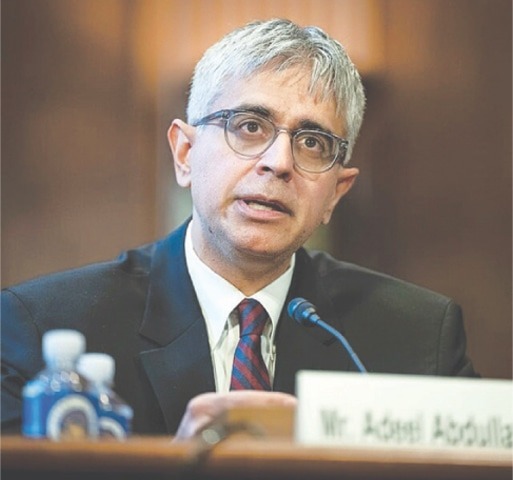WASHINGTON: As partisan tensions grow in the Senate, the chances of Adeel Abdullah Mangi, a Pakistani American nominated by President Joseph Biden to be a US Circuit Judge of Appeals, being confirmed are increasingly bleak.
Mangi will have trouble getting the simple majority required for confirmation because Republicans are against him and Democrats control the Senate by a razor-thin 51-to-49 margin. Mangi would create history if she was confirmed as the first Muslim American judge to hold a position on an appeals court, which has the last word in the majority of federal cases.
Joe Manchin and Democratic Senator Catherine Cortez Masto recently stated that they oppose Mangi’s candidacy. Mangi’s membership in the Alliance of Families for Justice, a nonprofit group that promotes criminal justice reform, especially with reference to instances involving people found guilty of killing law enforcement personnel, was mentioned by Cortez Masto. “I cannot support this nominee,” she uttered.
Mangi’s nomination was opposed by Republican Senator John Kennedy of Louisiana, who characterized the nominee as one of President Biden’s worst choices. Kennedy took issue with Mangi’s membership in the Alliance of Families for Justice and his purported associations with people from radical backgrounds.
He will have difficulty obtaining a simple majority in the Senate due to the Democrats’ 51-49 control.
Republicans further charged that Mangi was sympathetic to groups such as the Rutgers Centre for Security, Race, and Rights, which they claimed supported talks by speakers with ties to terrorism.
The attacks against Mangi were denounced by the White House as an Islamophobic disinformation campaign. According to White House spokesperson Andrew Bates, “Mr. Mangi is the target of a malicious and debunked smear campaign solely because he would make history as the first Muslim to serve as a federal appellate judge. Mr. Mangi has lived the American Dream and proven his integrity.”
Accusing Mangi of being a Muslim, New Jersey Attorney General Matthew J. Platkin said, “I cannot be silent as I watch, in horror, as Adeel Mangi is ruthlessly targeted by members of the United States Senate.”
It was a devastating picture for the first Muslim American federal circuit judicial nominee, Sheila Katz of the National Council of Jewish Women said, denouncing the targeting of Mangi because of his faith.
Along with ten other law enforcement agencies, the Police Conference of New York, the biggest police organization in the city, is against Mangi’s nomination. Regarding the Alliance of Families for Justice’s position on cop-killers and its demand for their release, they voiced concerns.
Bipartisan support is now essential for Mangi’s confirmation, since some Republican senators will have to cross party lines to support his nomination. But there’s no sign that this will happen, since resistance from both parties puts his nomination in doubt.
Mangi denied accusations made against him in a letter to Senator Cory Booker, emphasizing that it is untrue to imply sympathy for attacks on law officers. He vehemently denounced violence against law enforcement personnel and demanded that law enforcement agencies retract their accusations, stressing that the assertions are false.
Mangi’s admirers, such as Attorney General Platkin of New Jersey, contend that his words and actions demonstrate his dedication to justice and regard for law enforcement. They contend that, given the circumstances and qualifications, his nomination merits careful examination.
During Mangi’s nomination hearing, Republican senators faced criticism from the White House for what they called “cruel and Islamophobic attacks.” Senators Ted Cruz, Josh Hawley, and Tom Cotton—all Republicans—were picked out for a line of inquiry deemed to be hostile. Mangi was accused by the group of being associated with an organization that allegedly indoctrinates kids to despise America and Israel; the White House attributed this to Islamophobia.
Republican senators were criticized by the Anti-Defamation League (ADL) for aggressively interrogating Mangi about matters unrelated to his professional background or credentials. They said senators were biased against Mangi’s religion and had been asking him incessant questions.
Mangi responded by denouncing antisemitism and terrorism and by outlining his responsibilities within the advisory group. He clarified that he did not explore events, speakers, or irrelevant themes, and that the board concentrated on academic research.
Mangi’s confirmation is still in doubt because, in the face of continuous controversy and partisan divisions in the Senate, bipartisan support is required to secure his candidacy.








